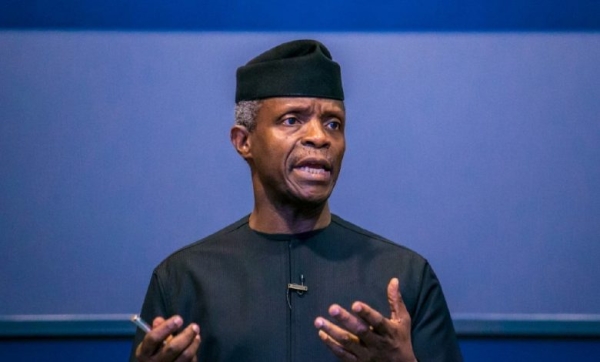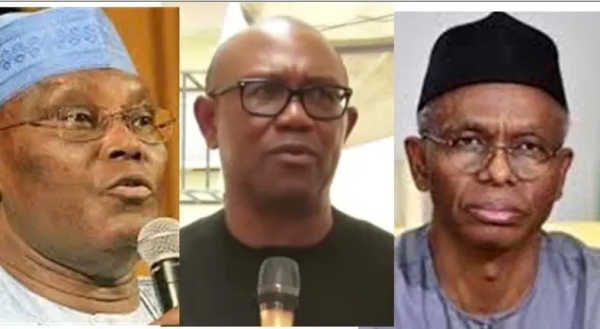TOP NEWS
Reuben's View
Latest News
Search
MOST READ
-
52,000 Nigerians migrated to UK for work, studies in 2024 – Report
-
Yul Edochie, wife, Judy welcome third child together
-
Man sentenced in Lagos for spraying, stomping on Naira
-
WAEC candidates in Delta sit for paper in darkness using torchlights
-
I’m expecting more defections to APC – Tinubu
-
I Know Road, I Will Lead You to Promised Land — President Tinubu to Nigerians
-
[FULL TEXT] Press Conference On The Illegal Detention, Harassment And Persecution Of Ms. Hamdiyyah Sharif Over Her Demand For End To Violence In Sokoto
-
Oil Production To Resume In Ogoniland Soon, After 30 Years - Ribadu
-
FG summons: Natasha’s lawyers promise defence with ‘factual evidence’
-
‘No roadmap to guarantee my re-election’ — Umo Eno says he’s leaving PDP
-
Many feared dead in Nyanya-Mararaba road accident in Abuja
936 times -
[OPINION] Let’s move JAMB’s Oloyede to INEC - Tonnie Iredia
706 times -
Live Vultures, Tortoises ‘Buried’ Inside – Abia Govt Speaks on Why Otti Has Avoided New Govt House
602 times -
What I Told Tinubu After He Asked Me To Make Peace With Fubara – Wike
591 times -
Nigeria Will Be Worse Than Somalia In The Next Few Years’ – Pat Utomi
578 times -
World War 3: UK, France, Canada Warn Israel Against Further Military Action In Gaza
540 times -
“Justice is at risk” – Osinbajo raises alarm, says Nigeria’s legal profession crumbling under corruption
521 times -
Nigeria Could Be Looking At Winning Team, If Atiku, Obi And El-Rufai Align’ – PDP
482 times -
2027: Atiku, Obi, El-Rufai coalition’ll defeat Tinubu if… – PDP
462 times -
2027 coalition: Atiku camp offers Obi VP role in one-term deal
446 times








![[OPINION] Zulum And The Surge In Insurgency - Reuben Abati [OPINION] Zulum And The Surge In Insurgency - Reuben Abati](https://reubenabati.com.ng/cache/mod_bt_contentslider/ad6e52c43f66e3cf537b06ad38aa93b6-8ac05a2894b5e82aeee611e792497153_XL.jpg)
![[OPINION] Defections And Threat Of One-Party State - Reuben Abati [OPINION] Defections And Threat Of One-Party State - Reuben Abati](https://reubenabati.com.ng/cache/mod_bt_contentslider/e16351efb50f01266cc28b7377bd5e83-90b1922af682fff68852fa7fab5a4331_XL.jpg)
![[OPINION] Pope Trump, Adebanjo And Other Stories - Reuben Abati [OPINION] Pope Trump, Adebanjo And Other Stories - Reuben Abati](https://reubenabati.com.ng/cache/mod_bt_contentslider/a9c28326249471b0c6d135375d9aa6d3-66656381f38ceca0faf1a84f4c1885dd_XL.jpg)
![[OPINION] CBEX Wealth Chasers, NDIC And The Fate Of Depositors - Reuben Abati [OPINION] CBEX Wealth Chasers, NDIC And The Fate Of Depositors - Reuben Abati](https://reubenabati.com.ng/cache/mod_bt_contentslider/e7c29125e793371f688b9def0c150948-867aa1263f279020e1b930969b024a70_XL.jpg)
![[OPINION] Pope Francis (1936 – 2025) - Reuben Abati [OPINION] Pope Francis (1936 – 2025) - Reuben Abati](https://reubenabati.com.ng/cache/mod_bt_contentslider/9df20a858100040a45e2fc6915d65f41-c0395aa98d8919afead20f020215aa2b_XL.jpg)
![[OPINION] Plateau, Tsiga and Trump - Reuben Abati [OPINION] Plateau, Tsiga and Trump - Reuben Abati](https://reubenabati.com.ng/cache/mod_bt_contentslider/d4ff657a4976c08f133a5993db7ca3de-076f7f795e47e1dc74a28ca93d3c698e_XL.jpg)
![[OPINION] The Uromi 16 And The Problem With Nigeria - Reuben Abati [OPINION] The Uromi 16 And The Problem With Nigeria - Reuben Abati](https://reubenabati.com.ng/cache/mod_bt_contentslider/848d0c6943c9a9cb7639e8f5640d2cbf-4b585f7414a3fc875b761851d4c5fcd4_XL.jpg)
![[OPINION] Breakfast With The Soludos - Reuben Abati [OPINION] Breakfast With The Soludos - Reuben Abati](https://reubenabati.com.ng/cache/mod_bt_contentslider/a98b5c30f61dcb10378fdba9f5e472ab-33b747862875f50d863e709f5955da5d_XL.jpg)
![[OPINION] The Emerging Coalition Against Tinubu/APC - Reuben Abati [OPINION] The Emerging Coalition Against Tinubu/APC - Reuben Abati](https://reubenabati.com.ng/cache/mod_bt_contentslider/ddd6416fbaa008a5bcbc568f0e3c8857-02972c9f0dee40a6ad85830afbb49758_XL.jpg)
![[OPINION] Nasir El-Rufai’s Defections: PDP, CPC, APC, SDP - Reuben Abati [OPINION] Nasir El-Rufai’s Defections: PDP, CPC, APC, SDP - Reuben Abati](https://reubenabati.com.ng/cache/mod_bt_contentslider/817d1e0c4d951b18f15f406968204870-61d46cc1859ac5d4f70406214a7d7e4f_XL.jpg)
![[OPINION] A World Of Godfathers - Reuben Abati [OPINION] A World Of Godfathers - Reuben Abati](https://reubenabati.com.ng/cache/mod_bt_contentslider/f282a08e8e116be2577cc430882505bc-6d66582218d28730d47a7b9a32e18004_XL.jpg)
![[OPINION] Babangida’s Book - Reuben Abati [OPINION] Babangida’s Book - Reuben Abati](https://reubenabati.com.ng/cache/mod_bt_contentslider/c8905774fa75570e79f747809f6c142f-4452414e756ce827f8bc4b72b9376062_XL.jpg)


![[OPINION] Evolution of “Sir” in Nigerian English Usage - Farooq A. Kperogi](https://reubenabati.com.ng/media/k2/items/cache/a2438f37f2cc84d68441c55d51bb07bc_XL.jpg?t=-62169984000)
![[OPINION] Hamdiyyah and Sokoto Governor’s Rejection-Sensitive Dysphoria - Farooq A. Kperogi](https://reubenabati.com.ng/media/k2/items/cache/5e20e0ed115e3b1529a35dc696f48f2b_XL.jpg?t=-62169984000)
![[OPINION] Why Davido is as Much Yoruba as He is Igbo - Farooq A. Kperogi](https://reubenabati.com.ng/media/k2/items/cache/3dbdc23bc9ba1cb1f7cb2d4b66c19c8a_XL.jpg?t=-62169984000)
![[ZOOM MEETING] City Talks with Reuben Abati:Compulsory Voting Bill and Electoral Reforms - Evans Ufeli](https://reubenabati.com.ng/media/k2/items/cache/b8efbbdd73ff1616713b59c71a50352f_XL.jpg?t=-62169984000)
![[PRESS RELEASE] Atiku visits Osun for coronation of new monarch of Ijeshaland](https://reubenabati.com.ng/media/k2/items/cache/e5fe522110b79a3b446572d1ef94d1f9_XL.jpg?t=-62169984000)























![[FULL TEXT] Press Conference On The Illegal Detention, Harassment And Persecution Of Ms. Hamdiyyah Sharif Over Her Demand For End To Violence In Sokoto](https://reubenabati.com.ng/media/k2/items/cache/726e353d077aa81f26ce434889f0752c_XL.jpg?t=-62169984000)









![[OPINION] Evolution of “Sir” in Nigerian English Usage - Farooq A. Kperogi [OPINION] Evolution of “Sir” in Nigerian English Usage - Farooq A. Kperogi](https://reubenabati.com.ng/cache/mod_bt_contentslider/c1a9b49e837c969261b6b2395103b7e0-a2438f37f2cc84d68441c55d51bb07bc_XL.jpg)
![[OPINION] Hamdiyyah and Sokoto Governor’s Rejection-Sensitive Dysphoria - Farooq A. Kperogi [OPINION] Hamdiyyah and Sokoto Governor’s Rejection-Sensitive Dysphoria - Farooq A. Kperogi](https://reubenabati.com.ng/cache/mod_bt_contentslider/c243398dde88b46784e52404e67b889f-5e20e0ed115e3b1529a35dc696f48f2b_XL.jpg)
![[OPINION] Why Davido is as Much Yoruba as He is Igbo - Farooq A. Kperogi [OPINION] Why Davido is as Much Yoruba as He is Igbo - Farooq A. Kperogi](https://reubenabati.com.ng/cache/mod_bt_contentslider/620bb6291c1dcdd74cbd8635970d91d8-3dbdc23bc9ba1cb1f7cb2d4b66c19c8a_XL.jpg)
![[OPINION] The Inside Story: How It All Went Down in Rome - Bianca Odumegwu-Ojukwu [OPINION] The Inside Story: How It All Went Down in Rome - Bianca Odumegwu-Ojukwu](https://reubenabati.com.ng/cache/mod_bt_contentslider/91f743255a2699103b46a311002ebe13-no-image.jpg)
![[ZOOM MEETING] City Talks with Reuben Abati:Compulsory Voting Bill and Electoral Reforms - Evans Ufeli [ZOOM MEETING] City Talks with Reuben Abati:Compulsory Voting Bill and Electoral Reforms - Evans Ufeli](https://reubenabati.com.ng/cache/mod_bt_contentslider/c909856d1daf0dcaefe8165c28db4d5d-b8efbbdd73ff1616713b59c71a50352f_XL.jpg)
![[PRESS RELEASE] Atiku visits Osun for coronation of new monarch of Ijeshaland [PRESS RELEASE] Atiku visits Osun for coronation of new monarch of Ijeshaland](https://reubenabati.com.ng/cache/mod_bt_contentslider/07b61c58f74e3f7277a0e5f9ad933070-e5fe522110b79a3b446572d1ef94d1f9_XL.jpg)























![[FULL TEXT] Press Conference On The Illegal Detention, Harassment And Persecution Of Ms. Hamdiyyah Sharif Over Her Demand For End To Violence In Sokoto [FULL TEXT] Press Conference On The Illegal Detention, Harassment And Persecution Of Ms. Hamdiyyah Sharif Over Her Demand For End To Violence In Sokoto](https://reubenabati.com.ng/cache/mod_bt_contentslider/f1246aa655fd6ebb510a0862ef37b5c5-726e353d077aa81f26ce434889f0752c_XL.jpg)
















![Nigeria ranks 4th in African countries for highest Schengen visa rejection [Full List] Nigeria ranks 4th in African countries for highest Schengen visa rejection [Full List]](https://reubenabati.com.ng/cache/mod_bt_contentslider/fb19bb9254053708d9d0104fb0e4465b-179e172057cdf2e473a05274838efcba_XL.jpg)





















![[OPINION] Ishaq Oloyede’s Cross - Azu Ishiekwene [OPINION] Ishaq Oloyede’s Cross - Azu Ishiekwene](https://reubenabati.com.ng/cache/mod_bt_contentslider/6089b20aff9db5cb1ac215c473fc6e9b-64be1af5c1e0e889898b67f1c0aff65f_XL.jpg)


















![[OPINION] Will Professor Oloyede’s JAMB now listen? - Abimbola Adelakun [OPINION] Will Professor Oloyede’s JAMB now listen? - Abimbola Adelakun](https://reubenabati.com.ng/cache/mod_bt_contentslider/c59ce7b741bcea1905289a89059712d8-f3e895c45a5272ca3f65b6ac4f9ce5f8_XL.jpg)



![[OPINION] That mischievous ‘don’t vote, go to jail’ bill - Ikechukwu Amaechi [OPINION] That mischievous ‘don’t vote, go to jail’ bill - Ikechukwu Amaechi](https://reubenabati.com.ng/cache/mod_bt_contentslider/ace591578e507400786884a4eae64df1-a35e3096d56ef73c0aebc04f0aa7eb80_XL.jpg)



![[OPINION] How Doctored Images and Viral Falsehoods Are Undermining Trust in Nigeria’s Politics - Isaac Asabor [OPINION] How Doctored Images and Viral Falsehoods Are Undermining Trust in Nigeria’s Politics - Isaac Asabor](https://reubenabati.com.ng/cache/mod_bt_contentslider/3e193975deadc19124f608e324f89c7c-25bf35d6f3add701fad1a974964107a1_XL.jpg)
![[OPINION] On the Trail of Plateau Killers - Olusegun Adeniyi [OPINION] On the Trail of Plateau Killers - Olusegun Adeniyi](https://reubenabati.com.ng/cache/mod_bt_contentslider/354d503a9537d113f5e59f399047dbf9-4adf3d197cc818fd607ef25bbbd3fd8a_XL.jpg)



















![Osun Prison Break: FG releases Names of Escaped Inmates [PHOTOS] Osun Prison Break: FG releases Names of Escaped Inmates [PHOTOS]](https://reubenabati.com.ng/cache/mod_bt_contentslider/965d51e92f02d2eb337faeb41740f8f5-64c30f6315fc26bddce725f8fc4af83a_XL.jpg)

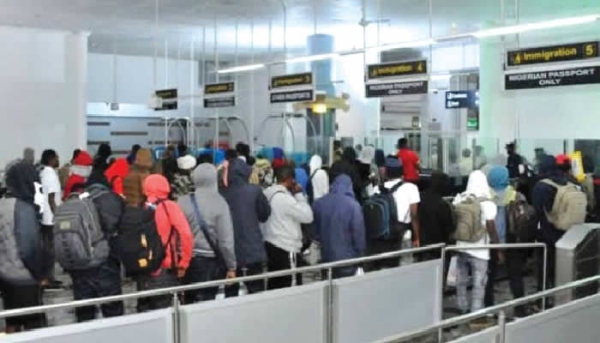





![[FULL TEXT] Press Conference On The Illegal Detention, Harassment And Persecution Of Ms. Hamdiyyah Sharif Over Her Demand For End To Violence In Sokoto](/media/k2/items/cache/726e353d077aa81f26ce434889f0752c_XL.jpg)
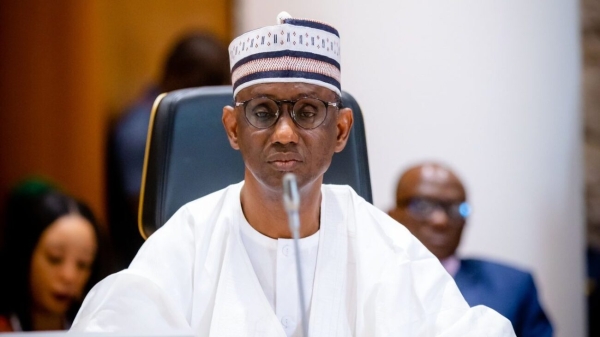
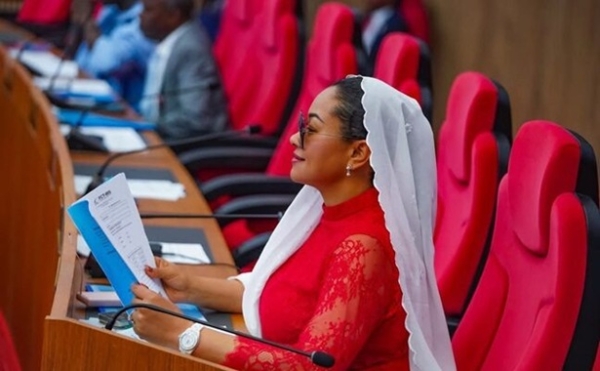


![[OPINION] Let’s move JAMB’s Oloyede to INEC - Tonnie Iredia](/media/k2/items/cache/2c2be4431a5aa89c2ef2c0d42d659e39_XL.jpg)




